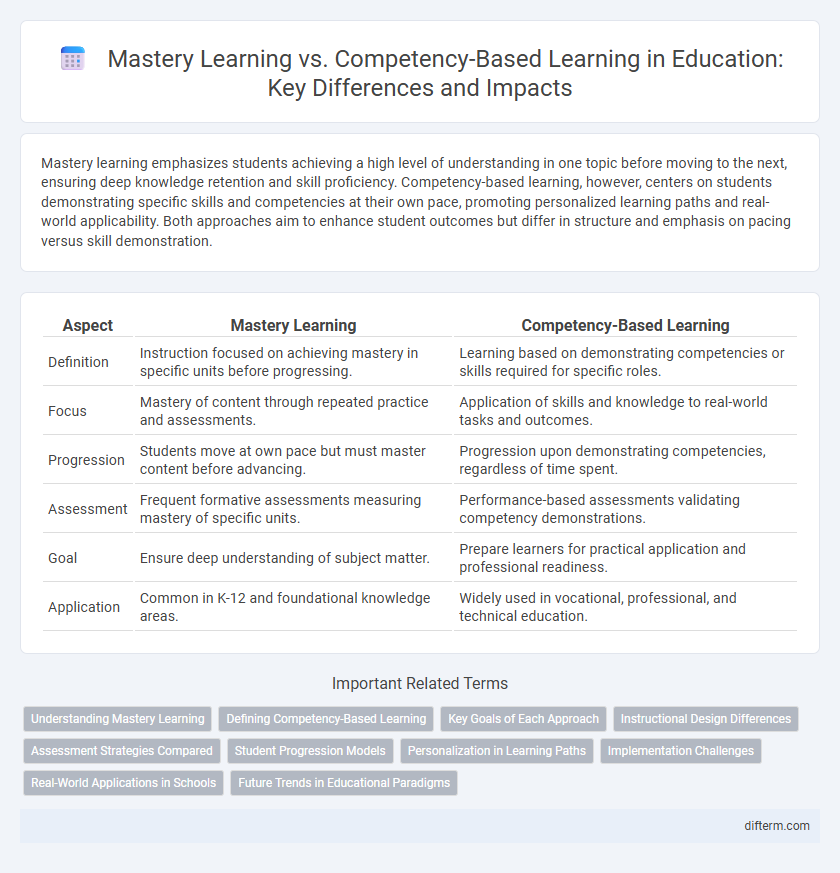Mastery learning emphasizes students achieving a high level of understanding in one topic before moving to the next, ensuring deep knowledge retention and skill proficiency. Competency-based learning, however, centers on students demonstrating specific skills and competencies at their own pace, promoting personalized learning paths and real-world applicability. Both approaches aim to enhance student outcomes but differ in structure and emphasis on pacing versus skill demonstration.
Table of Comparison
| Aspect | Mastery Learning | Competency-Based Learning |
|---|---|---|
| Definition | Instruction focused on achieving mastery in specific units before progressing. | Learning based on demonstrating competencies or skills required for specific roles. |
| Focus | Mastery of content through repeated practice and assessments. | Application of skills and knowledge to real-world tasks and outcomes. |
| Progression | Students move at own pace but must master content before advancing. | Progression upon demonstrating competencies, regardless of time spent. |
| Assessment | Frequent formative assessments measuring mastery of specific units. | Performance-based assessments validating competency demonstrations. |
| Goal | Ensure deep understanding of subject matter. | Prepare learners for practical application and professional readiness. |
| Application | Common in K-12 and foundational knowledge areas. | Widely used in vocational, professional, and technical education. |
Understanding Mastery Learning
Mastery learning emphasizes the importance of students achieving a high level of understanding in each topic before progressing, ensuring comprehension through repeated practice and targeted feedback. This approach contrasts with traditional time-based education by allowing varied learning paces tailored to individual needs. Research shows mastery learning improves retention and student performance by prioritizing deep knowledge acquisition over simply completing curriculum units.
Defining Competency-Based Learning
Competency-based learning emphasizes students' ability to demonstrate specific skills and knowledge at their own pace, ensuring mastery before progressing. This approach defines clear, measurable competencies that align with real-world tasks and outcomes. Unlike traditional models, it prioritizes personalized assessment and practical application over time spent in class.
Key Goals of Each Approach
Mastery learning aims to ensure students achieve a high level of understanding in a specific topic before moving forward, emphasizing thorough comprehension and skill proficiency. Competency-based learning focuses on students demonstrating mastery of defined skills or competencies at their own pace, promoting personalized progression tailored to individual strengths and needs. Key goals include mastery learning's emphasis on achieving mastery thresholds and competency-based learning's priority on measurable skill acquisition and learner autonomy.
Instructional Design Differences
Mastery learning emphasizes sequential instruction where students must demonstrate proficiency in one topic before moving to the next, often relying on frequent assessments and corrective feedback within a fixed curriculum. Competency-based learning centers on acquiring specific skills and knowledge units at an individualized pace, allowing learners to progress upon demonstrating competency regardless of time spent. Instructional design in mastery learning involves structured, time-bound lessons with clear benchmarks, while competency-based design requires flexible modules tailored to diverse learning paths and real-world performance criteria.
Assessment Strategies Compared
Mastery learning employs formative assessments to ensure students achieve a high level of understanding before progressing, utilizing frequent quizzes, targeted feedback, and corrective instruction. Competency-based learning emphasizes performance-based assessments that evaluate a student's ability to apply skills in real-world contexts, often including portfolios, projects, and demonstrations. While mastery learning focuses on mastering specific content units through incremental assessments, competency-based learning prioritizes demonstrating holistic proficiency aligned with defined competencies or standards.
Student Progression Models
Mastery learning emphasizes students achieving a high level of understanding in one topic before moving on, ensuring deep comprehension and retention. Competency-based learning allows students to progress by demonstrating specific skills or competencies at their own pace, fostering personalized education tailored to individual strengths and weaknesses. Both models prioritize student progression but differ in structure, with mastery learning focusing on content mastery and competency-based learning focusing on skill acquisition.
Personalization in Learning Paths
Mastery learning emphasizes personalized learning paths by allowing students to progress only after demonstrating a thorough understanding of each concept, ensuring mastery before advancing. Competency-based learning also personalizes education but focuses on acquiring specific skills and competencies at an individual pace, often allowing learners to bypass content they already know. Both approaches prioritize tailored instruction, but mastery learning concentrates on depth of knowledge while competency-based learning targets practical skill acquisition.
Implementation Challenges
Mastery learning faces challenges in implementation due to the need for individualized pacing and frequent assessments, which demand significant teacher time and resources. Competency-based learning struggles with standardizing competency definitions and ensuring consistent evaluation across diverse learning environments. Both approaches require robust data systems to track progress and support personalized instruction, highlighting the necessity for technological infrastructure and professional development.
Real-World Applications in Schools
Mastery learning emphasizes achieving a deep understanding of specific subjects before advancing, ensuring students grasp fundamental concepts thoroughly. Competency-based learning prioritizes the ability to apply skills and knowledge effectively in real-world scenarios, tailoring education to practical outcomes. Schools integrating these approaches foster critical thinking and problem-solving abilities, preparing students to meet diverse workplace demands and adapt to evolving industries.
Future Trends in Educational Paradigms
Mastery learning emphasizes achieving a high level of understanding in one topic before progressing, while competency-based learning prioritizes demonstrating specific skills across various contexts. Future trends indicate a convergence of these approaches, leveraging adaptive technologies and personalized pathways to optimize student outcomes. Educational paradigms are shifting towards flexible, skills-focused models supported by data-driven assessments and real-time feedback systems.
mastery learning vs competency-based learning Infographic

 difterm.com
difterm.com